Thursday, August 18th 2016

AMD Demos Breakthrough Performance of the ZEN CPU Core
At an event last night in San Francisco, AMD provided additional architectural details and a first look at the performance of its next-generation, high-performance "Zen" processor core. AMD demonstrated the "Zen" core achieving a 40% generational improvement in instructions per clock, delivering a landmark increase in processor performance.
During the event, AMD demonstrated an 8-core, 16-thread "Summit Ridge" desktop processor (featuring AMD's "Zen" core) outperforming a similarly configured 8-core, 16-thread Intel "Broadwell-E" processor when running the multi-threaded Blender rendering software with both CPUs set to the same clock speed. AMD also conducted the first public demonstration of its upcoming 32-core, 64-thread "Zen"-based server processor, codenamed "Naples," in a dual processor server running the Windows Server operating system."The performance and efficiency of our 'Zen' core showcases AMD at its best," said Dr. Lisa Su, president and CEO of AMD. "Over the last four years we have made significant investments to develop a high-performance, multi-generation CPU roadmap that will power leadership products. Customer excitement for 'Zen' continues to grow as we make significant progress towards the launch of new products that will span from the datacenter to high-end PCs."
The "Zen" processor core features multiple architectural advances designed to increase the performance, throughput, and efficiency of AMD's future products. "Zen" is based on a clean-sheet design and features a new cache hierarchy, improved branch prediction and simultaneous multithreading (SMT). These advances will allow the "Zen" core to scale to meet the needs of a broad range of applications, including fanless 2-in-1s, embedded systems, high-performance computing, and the datacenter."An engineer may get one chance in their career to work on a project of this size and scope, and maybe never one with as much potential to impact the future as much as 'Zen,'" said Mark Papermaster, senior vice president and chief technology officer at AMD. "With 'Zen' we aim to do what many never thought possible - deliver a 40 percent generational improvement in instructions per clock while maintaining power requirements in line with our previous generation technology."
"AMD invested where it counts, with an x86 core that can scale from PCs to high-performance servers," said Linley Gwennap, principal analyst, Linley Group. "Consumers today expect to get the most out of their systems to create transformative experiences. The versatile design of 'Zen' delivers highly-efficient performance that should provide increased computing capabilities across the spectrum - from devices to cloud computing."Expected to launch first, the "Zen"-based "Summit Ridge" desktops will utilize the AMD AM4 socket, a new unified socket infrastructure that is compatible with 7th Generation AMD A-Series desktop processors - previously codenamed "Bristol Ridge" - for exceptional performance and connectivity scalability required by AMD partners and customers. The first desktop systems featuring 7th Generation AMD A-Series processors and new AM4 sockets are scheduled to ship in the second half of 2016 in OEM PC designs.
With dedicated PCIe lanes for cutting-edge USB, graphics, data and other I/O, the AMD AM4 platform will not steal lanes from other devices and components. This allows users to enjoy systems with improved responsiveness and benefit from future-ready technologies that the AM4 platform provides with a powerful, scalable and reliable computing solution.
AMD AM4 platform key technology features include:
During the event, AMD demonstrated an 8-core, 16-thread "Summit Ridge" desktop processor (featuring AMD's "Zen" core) outperforming a similarly configured 8-core, 16-thread Intel "Broadwell-E" processor when running the multi-threaded Blender rendering software with both CPUs set to the same clock speed. AMD also conducted the first public demonstration of its upcoming 32-core, 64-thread "Zen"-based server processor, codenamed "Naples," in a dual processor server running the Windows Server operating system."The performance and efficiency of our 'Zen' core showcases AMD at its best," said Dr. Lisa Su, president and CEO of AMD. "Over the last four years we have made significant investments to develop a high-performance, multi-generation CPU roadmap that will power leadership products. Customer excitement for 'Zen' continues to grow as we make significant progress towards the launch of new products that will span from the datacenter to high-end PCs."
The "Zen" processor core features multiple architectural advances designed to increase the performance, throughput, and efficiency of AMD's future products. "Zen" is based on a clean-sheet design and features a new cache hierarchy, improved branch prediction and simultaneous multithreading (SMT). These advances will allow the "Zen" core to scale to meet the needs of a broad range of applications, including fanless 2-in-1s, embedded systems, high-performance computing, and the datacenter."An engineer may get one chance in their career to work on a project of this size and scope, and maybe never one with as much potential to impact the future as much as 'Zen,'" said Mark Papermaster, senior vice president and chief technology officer at AMD. "With 'Zen' we aim to do what many never thought possible - deliver a 40 percent generational improvement in instructions per clock while maintaining power requirements in line with our previous generation technology."
"AMD invested where it counts, with an x86 core that can scale from PCs to high-performance servers," said Linley Gwennap, principal analyst, Linley Group. "Consumers today expect to get the most out of their systems to create transformative experiences. The versatile design of 'Zen' delivers highly-efficient performance that should provide increased computing capabilities across the spectrum - from devices to cloud computing."Expected to launch first, the "Zen"-based "Summit Ridge" desktops will utilize the AMD AM4 socket, a new unified socket infrastructure that is compatible with 7th Generation AMD A-Series desktop processors - previously codenamed "Bristol Ridge" - for exceptional performance and connectivity scalability required by AMD partners and customers. The first desktop systems featuring 7th Generation AMD A-Series processors and new AM4 sockets are scheduled to ship in the second half of 2016 in OEM PC designs.
With dedicated PCIe lanes for cutting-edge USB, graphics, data and other I/O, the AMD AM4 platform will not steal lanes from other devices and components. This allows users to enjoy systems with improved responsiveness and benefit from future-ready technologies that the AM4 platform provides with a powerful, scalable and reliable computing solution.
AMD AM4 platform key technology features include:
- DDR4 Memory
- PCIe Gen 3
- USB 3.1 Gen2 10Gbps
- NVMe
- SATA Express
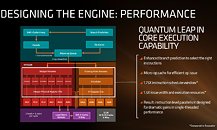
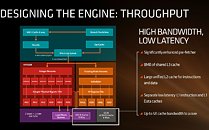
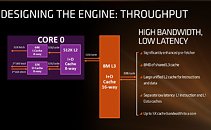
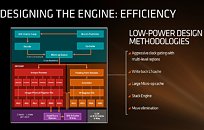
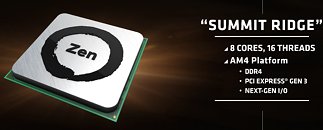
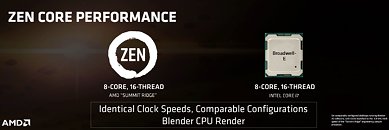
187 Comments on AMD Demos Breakthrough Performance of the ZEN CPU Core
The only drawbacks I think Zen will have is that the CPUs will sport a higher TDP; I'm thinking about 165w for a 8C/16T part at 3.2Ghz or so. I'm pretty sure AMD is brute forcing all of this performance for the time being and will later be refined. Maybe I'll pick up the revised Zen.
Make judgement - after - it's released, not before.
"We are on par with our performance targets"
Sums about it. And if anyone has any doubts about that blender render, please count the time from the moment that button was pressed until that bench finished up. Compare results to other systems and do your own math.
Don't get me wrong, I want Zen to be great and succeed! Just don't read too much into this.
I think i jumped from Intel to an AMD Athlon 64 4000 (San Diego) cpu while shortly after it got rendered useless compared to a cheaper intel core duo. I think i paid close to 400 euro for the AMD cpu while the i3 was like 120 ish.
I'm not falling for this hype again.
choo-choo! All aboard the hype train!
:clap:
I mean we are totally bias here right its not like we have been lied to time and time again or anything
If Zen can improve its generational performance leap by 20-30% compared to the 40% it is claiming, I will be more than happy.
Annywaay, real world test is nice. But I don't expect it to last if they perform different tests. Remember the goal was Haswell-ish performance, iirc.
I'm happy for them.. I go with performance.. Idc about cost. If AMD can beat intel, I'll be looking at it. Anyone with sense would do the same thing.
But don't make huge assumptions based on half tests..
So I hope maybe AMD gets lucky and has a surprise performance breakthrough despite fighting an underdog battle without the huge R+D spend Intel has, because I would love to be able to go back to AMD and the competition is badly needed. But...I'll believe it when I see it, as in third-party real released product benchmarks. We've been hearing about your secret weapon Piledriver/Steamroller, etc. cpu for the past 10 years and have been let down every time, prove the doubters wrong this time AMD.